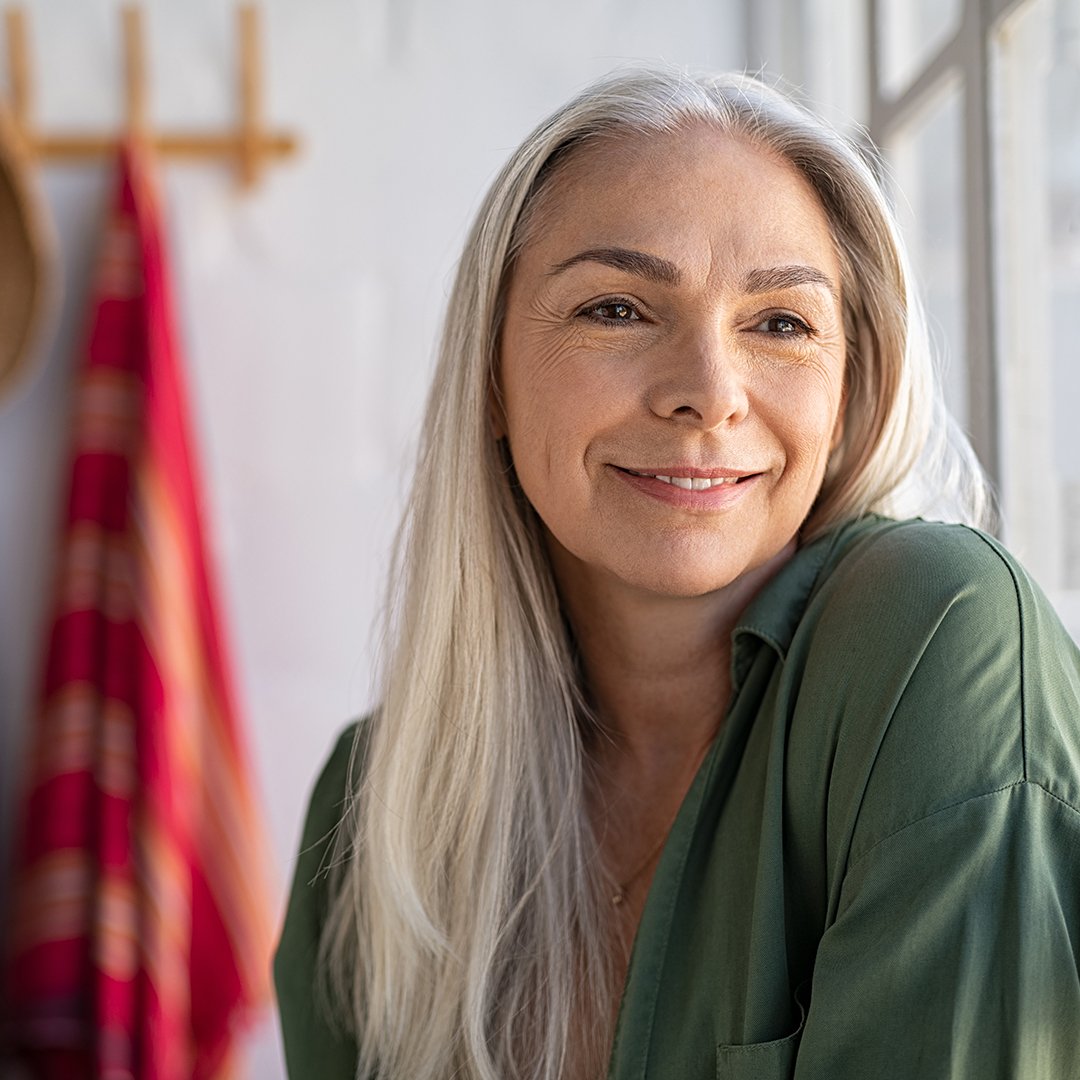This article is written in partnership with AlgaeCal. They’re dedicated to creating a bone health revolution, and we’re honored to work with them. ~ ed.
“Life begins at 40?” Heck yes! (But don’t forget your bone health.)
Many women say they experience a change—an awakening, even—around this age. With my 39th birthday around the corner, I can vouch for this so-called “40 Phenomenon.”
I am more at home in my body than ever. I have a clearer sense of purpose and direction in my career. I know who I am and what I want. Thanks to this growing sense of self, my relationships are also evolving for the better. At the same time, I care less and less about what others think of me.
There is certainly an upside to getting older. But, there is also a flip side that comes with the territory.
Bone health: the aging issue we can’t afford to ignore after 40.
Our bodies change as we age. It’s inevitable. We may have seen our mothers go through menopause. If we’re lucky, we’ll get advice from them or others who’ve been there.
We may expect the seismic shifts that lie ahead—starting after 40, through our 50s, and beyond. We still don’t talk about our health challenges as women. And this is especially true for our bone health.
Once we hit the big “four-zero,” we start to lose bone density at a rate of around 1% a year. So, while 40 may be “the new 30,” our bones sure didn’t get the memo.
An easy, natural solution to ensure strong, healthy bones beyond 40 >>
3 Things we need to do after 40 to Protect our Bone Health.
The first thing that comes to mind is, of course, calcium supplements. While calcium is a big part of the picture, there is much more to protecting our bones that we all can, and should, be doing.
There is also much more to choosing a good calcium supplement than we may be aware of.
The experts at AlgaeCal have some advice. And they know what they’re talking about. Their Bone Builder supplement duo is the only one with three clinical studies to show they improve bone density.
Watch: AlgaeCal Bone Health Success Stories >>
1. DEXA Scans 101: Why & How to Get a Bone Density Test after 40.
DEXA stands for dual-energy X-ray absorptiometry. These scans are the best method to diagnose and track bone density loss. DEXA is more accurate than a regular x-ray or CAT scan and requires less radiation exposure.
Due to those hormonal changes, women are at a higher risk of bone density loss. Hormones aside, we lose 1% of our bone density a year from the time we are 40. Our family history and body frame also factor in, putting us at greater risk.
Take a bone-building supplement. Eat a nutrient-rich diet. Do weight-bearing exercise (read on for more about that). These things are all helpful to combat bone density loss. But a DEXA scan is the only way to get a clear picture of where we stand to begin with.
Mammograms and cervical smears are par for the course as women get older, so why neglect our bone health? Especially once we realize how quick and easy it is to get this test done.
There are two main variations:
Central DEXA looks at your whole skeleton, especially your spine and hips. These machines are usually found in hospitals and medical centers. Some doctors’ offices have them too. You lie on a padded table while a technician guides you through the process. This usually takes less than 30 minutes, depending on the equipment and what part of your body it scans.
Peripheral DEXA (also called screening tests) are smaller and focus on your extremities. In other words, fingers, ankles, and wrists. You often find peripheral DEXA machines in a doctor’s office or a smaller medical exam facility. Sometimes, you’ll also see them at health fairs or even bigger shopping malls. These scans only take around 10 minutes. You place your finger, hand, forearm, or foot in a small device that obtains a quick bone density reading.
You can do both scans on an “outpatient” basis, meaning you don’t have to go to the hospital to take this test.
Read more: what DEXA scores measure & what your results mean >>
A low bone density might sound like a scary prospect. But remember there’s a lot we can do about that. Think of it more as a helpful “you are here” marker that points you in the right direction.
Your bones need 16 nutrients to be strong and healthy. But, hardly anyone even knows about this one, let alone gets enough.
2. Boron: the “forgotten” mineral that’s crucial for healthy bones.
Fuelling our bones with the nutrients they need to stay strong and healthy is vital. Our bones need 13 minerals and 3 vitamins, in particular. These are calcium, magnesium, boron, strontium, zinc, selenium, potassium, phosphorus, copper, nickel, vanadium, silicon, manganese, vitamin C, vitamin D3, and vitamin K2.
If calcium is the superstar, boron is the unsung hero of bone health. Scientists have known for decades that it’s essential for bones. Even a study done 30 years ago found that boron supplements reduced perimenopausal women’s daily calcium loss by 44%.
Yep, we can actually end up peeing out much of the calcium we take. Boron helps counter that.
Research also shows that in areas of the world where getting boron in food is rare (so intake is low) the incidence of arthritis ranges from 20 to 70% of the population! Whereas in regions where boron intakes are higher (3mg -10mg), cases of arthritis are from 0 to 10%.
It is best to get supplemental boron in combination with other minerals, not by itself. This is partly because it affects the way the body handles minerals including magnesium, calcium, and phosphorus.
AlgaeCal Plus, for example, combines boron (at 3 mg per daily dose) with dozens of other minerals so that they work together to build strong bones.
Get the only bone-building supplement that guarantees your result >>
3. Move with your bones in mind: simple exercises everyone can do.
Exercise is crucial to maintaining healthy bones. Regular exercise puts stress on your bones which helps them become denser and stronger. It also combats age-related muscle loss so we can stay strong and fierce well into our 70s and beyond.
When it comes to supporting our bone health, certain types of exercise are more beneficial than others:
1.Weight-Bearing Exercise
A weight-bearing exercise is an activity that you do while on your feet. Your bones and muscles are thus forced to work against gravity as they keep you upright. Weight-bearing activities place healthy stress on your bones. This helps them become stronger and increases your bone mineral density.
There are high-impact weight-bearing exercise options like running, hiking, or racquet sports. Brisk walking, yoga, or Pilates are some of the lower-impact options.
2.Muscle-Strengthening Exercise
These exercises involve working your muscles against an opposing force. The opposing force could be a dumbbell, a resistance band, or even your own body weight. And no, you do not have to be a bodybuilder to do these.
They also include resistance exercises (using bands or tubes), bodyweight exercises (like squats and push-ups), and functional movements (like standing and rising up on your toes)
Here’s a simple at-home routine (with “how-to” videos & free PDF) >>
Exercise alone is not enough. But it’s an important factor in a healthy lifestyle, as it supports so much more than healthy bones.
We must combine it with proper nutrition if we want to improve our bone density as we age. AlgaeCal’s Bone Builder Pack provides all 16 essential nutrients our bones crave.
AlgaeCal’s goal is to actually increase bone density—not only slow down bone loss. And it’s guaranteed to do that in as little as six months. It’s also plant-based, highly-bioavailable, and sustainably-sourced.
It would be a shame to waste the upsides of getting older because we’ve neglected something so easy to address. So, if you want life to begin at 40, don’t forget about those bones!
 Share on bsky
Share on bsky


Read 4 comments and reply